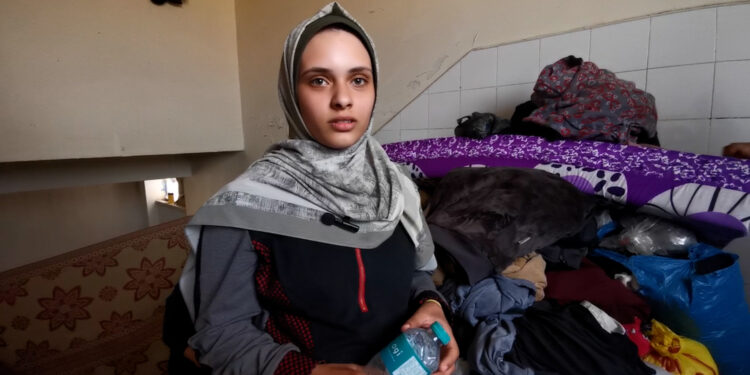Gaza- Palestinian Reham Jagloub sits on the edge of the stairs with her stomach stretched out in front of her, waiting for her due date and does not know what to do, as she has no clothes or supplies for her birth, nor for her newborn to protect him from the cold and the difficult nights of war.
She added with sadness evident on her features, “I cannot find a place to sit and rest. During displacement, there is not even a room for me or a mattress to sleep on. My back is split in two from the pain. We are all one family, made up of 11 individuals. We sleep on the edge of the stairs. Even clean water and food are not available.” “.
As for Sarah, she also has her own suffering, and she tells Manhattan Tribune Net in her tired voice, “My story is sad. I am seven months pregnant and every missile that falls around us, I feel it in my heart. I cannot bear the sound of the violent bombing.”
She added, “We were displaced 4 times, and each time we escaped certain death. I fell to the ground and fell on my stomach during my displacement from Gaza to Khan Yunis. To this day, I feel great pain in my gut, and my biggest concern is being born in war. I have no clothes for myself or for my son.” “.
When we asked her about food and water, she said, “We do not have food or enough water. For two full days I did not drink water, neither sweet nor salty. The infections killed me and I cannot find anyone to help me. Even the medicine pills (folic acid) that I need during all months of my pregnancy do not I can find someone to provide it for me, as it has sold out in all pharmacies.”
“No health care”
Director of Tahrir Maternity Hospital, Walid Abu Hatab, told Manhattan Tribune Net, “The work environment inside the hospital to follow up on pregnant women is very bad, as a result of the increase in the number of displaced people who take refuge and shelter from the place, in addition to our allocation of beds for the wounded, which caused a shortage of those for pregnant women, and we were forced to “Hypnotizes a lot of cases on the ground.”
Abu Hatab says, “Since the first day of the aggression on Gaza, we have received about 50 natural births, and between 15 and 17 caesarean sections. We have noticed an increase in infections and bacteria after surgical operations, due to our inability to resist environmental diseases, as a result of the great shortage of cleaning materials and supplies.” .
The hospital director said, “Unfortunately, there is no health care for pregnant women in the recent period, and they are not provided with nutritional supplements, in addition to malnutrition due to the lack of food and water, which has caused an increase in anemia in pregnant women. I expect an increase in the rate of diseases and deaths regarding health services.” Reproductive.”
International appeals
UNICEF, the United Nations Relief and Works Agency for Palestine Refugees (UNRWA), the United Nations Population Fund, and the World Health Organization warned of the disruption of health services for mothers and newborns, due to the ongoing bombing operations, and that health facilities were damaged or stopped working, as there are about 50,000 pregnant women in the Gaza Strip. They lack the necessary health care.
The agencies expected maternal deaths in Gaza to rise, and also warned of the psychological effects resulting from the war, and its direct consequences on reproductive health, including a rise in miscarriages and premature births resulting from stress and fear.



